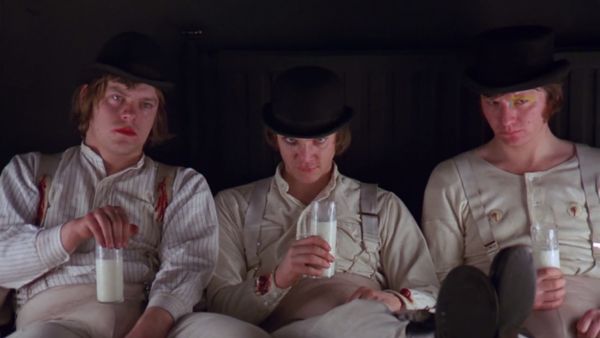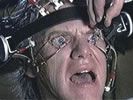Eye For Film >> Movies >> A Clockwork Orange (1971) Film Review
A Clockwork Orange
Reviewed by: Angus Wolfe Murray

After 28 years on the shelf, the violence is as fresh as Saturday night. What is more surprising is Stanley Kubrick's passion for ladies with their kit off. The erotic nature of the film is tied to aggression. Someone is murdered with a sculptured penis, another raped by Alex (Malcolm McDowell) with his boots on.
There is no doubt that, of its time, A Clockwork Orange was groundbreaking, not necessarily for the best reasons. It is still one of the nastiest films ever made, although attacks on the director for romanticising such behavior looks exaggerated now. McDowell hardly matches up to Brando in The Wild One as a role model and his gang of three are little more than goofy thugs.

The first half is the strongest, because you don't know where it's going and Kubrick is so intoxicated by his monster almost anything could happen. Once you realise what Anthony Burgess' script is on about, not exactly retribution, but a healthy dose of brainwashing to cleanse the vicious tendencies in juvenile delinquents, it turns into farce, with Patrick Magee going so far over the top, he appears to lose his mind.
It takes place somewhere in the future, when law and order has been superseded by anarchic gang rule. Homeless old men are sitting targets, their vulnerability being an object of disgust. Exponents of the new meritocracy, who live in poncy modern houses, surrounded by erotic art, deserve a visit from Alex & Co to curb their intellectual arrogance.
Once in prison, he is chosen as guinea pig in the Government's new-criminals-for-old campaign, based on the alcoholics cure technique of making patients gag at the thought of booze, or in Alex's case, sex and violence.
Burgess's invented language, spoken by the riffraff, but not the toffs, is nothing but a literary device to give his confection a semblance of originality. It retains an arcane silliness, like coded slang in the Upper Sixth.
Kubrick's preferred method of working, in studios, carries a stylised artificiality. Some of the acting is poor. Alex's "droogs" are given no personality and even McDowell, who tells the story with a voice-over narrative, is suitably loutish, without the charisma of a successful villain. The prison officers behave as if they are still in the army - Michael Bates is particularly good as the Sergeant Major/Chief Guard - and politicians belong to a past age, when educated accents were part of the uniform.
Does it survive the passage of time? Yes and no. The first half is full of powerful sexual imagery. The second half drags and suddenly becomes absurd.
Reviewed on: 19 Jan 2001



















